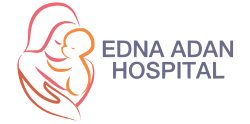| Edna Adan Maternity Hospital | |
|---|---|
 | |
 | |
 | |
| Geography | |
| Location | Hargeisa, Somaliland |
| Coordinates | 9°33′03″N44°03′59″E / 9.550873°N 44.066354°E |
| Organisation | |
| Funding | Non-profit |
| Type | Specialist |
| Affiliated university | Edna Adan University |
| Patron | Edna Adan Ismail |
| Services | |
| Beds | 69 |
| Speciality | Obstetrics (Antenatal/Postnatal), Gynecology, Teaching hospital |
| History | |
| Opened | 2002 |
| Links | |
| Website | www |
Edna Adan Maternity Hospital is a non-profit charity hospital built in Hargeisa, Somaliland. It was founded by the autonomous [1] northwestern Somaliland region's former foreign minister and former first lady of Somalia, Edna Adan Ismail. The hospital provides health care to people whose lives have been traumatized by war, and trains nurses, midwives, and other health workers. In addition to services and facilities relating specifically to maternal and infant health care, the hospital has diagnostic laboratory facilities and an emergency blood bank, and offers diagnosis and treatment for sexually transmitted diseases.
Contents
It works in collaboration with the Ministry of Health, UNICEF, and WHO to train a new generation of nurses and midwives to provide Reproductive Health care throughout the Somaliland region.
Another aspect of the hospital's mission is to combat the practice of female circumcision, which is endemic to the region. Mothers of newborn girls are counseled on the dangers of having their child circumcised; the tradition is strongly ingrained in the culture. [2]
